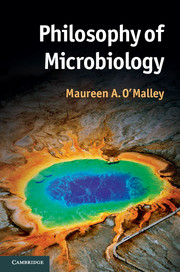Book contents
- Frontmatter
- Contents
- List of figures and tables
- Acknowledgements
- An introduction to philosophy of microbiology
- Chapter 1 Philosophy in microbiology; microbes in philosophy
- Chapter 2 Philosophical debates in high-level microbial classification
- Chapter 3 Philosophical debates in species-level microbial classification
- Chapter 4 Philosophical issues in microbial evolution
- Chapter 5 Microbial ecology from a philosophical perspective
- Chapter 6 Microbes as model biological systems
- Conclusion: further philosophical questions
- Glossary
- References
- Index
Chapter 6 - Microbes as model biological systems
Published online by Cambridge University Press: 05 September 2014
- Frontmatter
- Contents
- List of figures and tables
- Acknowledgements
- An introduction to philosophy of microbiology
- Chapter 1 Philosophy in microbiology; microbes in philosophy
- Chapter 2 Philosophical debates in high-level microbial classification
- Chapter 3 Philosophical debates in species-level microbial classification
- Chapter 4 Philosophical issues in microbial evolution
- Chapter 5 Microbial ecology from a philosophical perspective
- Chapter 6 Microbes as model biological systems
- Conclusion: further philosophical questions
- Glossary
- References
- Index
Summary
This chapter investigates the way in which microbes have been used in general biological research. Microbial model systems have served as the material and epistemic bases for several incarnations of molecular biology, as well as experimental evolution and ecology. Microbes have been used to exemplify general theoretical accounts and concepts, pertinent to all life, and they do this via capacities for representation and tractability. Microbial model systems also illuminate philosophical analyses of classification, evolution and ecology. I suggest as a conclusion that philosophy should start with microbes as the entry point into biological reflection and only subsequently focus on larger organisms.
Microbes as model molecular systems
Bacterial genetics has had more profound impact on the development of modern biology than any other biological discipline
(Brock 1990: 1).The idea that microorganisms could be used to understand any life form has important roots in the late-nineteenth century. Beijerinck – whom we met in the ecology and classification chapters – argued alongside founding geneticist William Bateson (1861–1926) that bacteria should be understood as genetic and biochemical model systems. He thought they were both experimentally tractable and representative of all forms of life (Beijerinck 1900–1901; Bateson 1907, in Summers 1991). Beijerinck’s research focused on how different bacterial physiologies could be understood as adaptations to environmental conditions. He believed that microbiology could contribute to a universal theory of life that would be built on the new science of heritability and variation (1895, in Theunissen 1996; van Iterson et al. 1983 [1940]). This science eventually would be known as genetics, and Beijerinck predicted that enzymes would form the material basis of inheritable ‘genes’.
- Type
- Chapter
- Information
- Philosophy of Microbiology , pp. 173 - 200Publisher: Cambridge University PressPrint publication year: 2014

